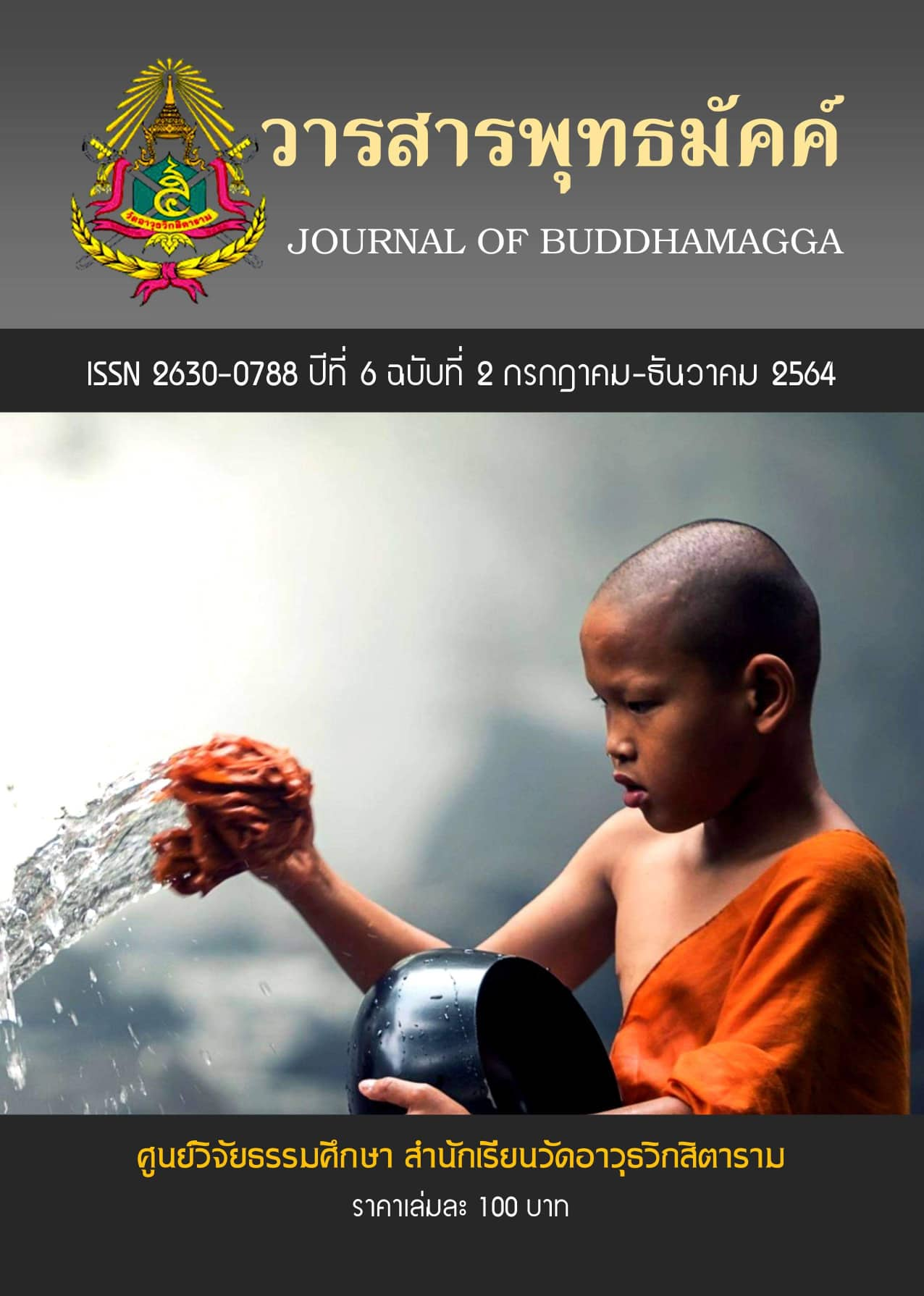THE APPLICATION OF BUDDHIST PRINCIPLES TO THE DEVELOPMENT OF POLITICAL ETHICS OF THE POLITICAL LEADERS IN CHAIYAPHUM PROVINCE
Keywords:
Buddhist Principles, Political Ethics, Political Leaders in Chaiyaphum ProvinceAbstract
The purposes of the research are 1) to study the general conditions of political ethics of the political leaders in Chaiyaphum Province 2) to study the standard of political ethics of the political leaders in Chaiyaphum Province, and 3) to apply Buddhist principles to the development of political ethics of the political leaders in Chaiyaphum Province. The research method is mixed methodology. The data of qualitative research were collected from 21 key informants by means of in-depth interview with data analysis by description. The data of quantitative research were collected from 400 samples of 587,556 constituents aged 18 years upwards in Chaiyaphum Province. The data were analysed by descriptive statistics: frequency, percentage, mean, and standard deviation.
The result found that 1. The general conditions of political ethics of the political leaders were as follows: 1) the adherence to the main national institutions-nation, religion and monarch, realizing the values of the institutions, joining the state’s ceremonies, applying the philosophy of sufficient economy for livelihood, participating in religious ceremonies, and raising national and symbolic flags at the buildings fenses on the special occasions to show loyalty to the institutions, 2) honesty and good consciences to the responsible duties by participating the assembly meeting approving the budget bills honestly, checking the budget spending in line with the budget bills, behaving as a good model in livelihood, and living sufficiently, 3) dare to make decision correctly and righteously by following-up and monitoring the development projects that used the budget, participating in the committee to follow-up the development projects to solve the problems of the people promptly, daring to make decision and valuing the time value, 4) regarding the public interests more than personal ones and having the public mind, joining public meetings and public activities in the community such as tree planting, cleaning and garbage separating to reduce the garbage in the community, 5) focusing on work success, controlling and following-up the duty performance in line with the development plans emphasizing public interests, being reasonable and promoting to work reasonably, 6) performing duties fairly and impartially, following rules, regulations and social traditions, approving the budget spending in all the areas, not only specific area of one own and 7) behaving as a good model and saving an official image, having the principles, being a public example, dressing properly, promoting the local unique products. 2. The standard of political ethics of the political leaders in Chaiyaphum Province totalises at high level (=3.56, S.D.=0.32). 3. The application of Buddhist principles to the development of political ethics of the political leaders in Chaiyaphum Province according to Seven Sappurisa-dhamma or seven qualities of a good man totalises at high level (=3.64, S.D.=0.71).
References
ภาษาไทย
มหาจุฬาลงกรณราชวิทยาลัย. (2539). พระไตรปิฎกภาษาไทย ฉบับมหาจุฬาลงกรณราชวิทยาลัย. กรุงเทพมหานคร : โรงพิมพ์มหาจุฬาลงกรณราชวิทยาลัย, 2539.
ณัฐดนัย แก้วโพนงาม. (2560). เศรษฐศาสตร์การเมืองในบริบทสังคมไทยภายใต้สภาวะความขัดแย้งในจังหวัดชัยภูมิ. รายงานการวิจัย สถาบันวิจัยพุทธศาสตร์ : มหาวิทยาลัยมหาจุฬาลงกรณราชวิทยาลัย.
พระครูรัตนสุตากร (ปราโมทย์ ล่องแก้ว) และคณะ. (2563). การพัฒนาการเมืองตามหลักพุทธธรรม. วารสารมหาจุฬานาครทรรศน์. ปีที่ 7 ฉบับที่ 10 ตุลาคม.
พระไพศาล วิสาโล. (2546). พระพุทธศาสนาไทยในอนาคต แนวโน้นและทางออกจากวิกฤติ. กรุงเทพมหานคร : มูลนิธิสดศรี สฤษดิ์วงศ์.
พระมหานรินทร์ สุรปญฺโญ (เอมพันธ์). (2562). การพัฒนาคุณธรรมจริยธรรมของผู้นำตามแนวพุทธ. วารสารชัยภูมิปริทรรศน์. ปีที่ 2 ฉบับที่ 1 มกราคม-เมษายน.
พระราชบัญญัติมาตรฐานทางจริยธรรม. (2562). ราชกิจจานุเบกษา 136 เมษายน 2562.
รังสิทธิ วิหกเหิน และคณะ. (2559). พุทธจริยธรรมแนวคิดปรัชญาและกระบวนการเสริมสร้างสังคมสันติสุข
ในจังหวัดบุรีรัมย์. รายงานการวิจัย เงินทุนอุดหนุนจากมหาวิทยาลัยมหาจุฬาลงกรณราชวิทยาลัย : มหาวิทยาลัยมหาจุฬาลงกรณราชวิทยาลัย.
ศิลาวัฒน์ ชัยวงศ์. (2561). จริยธรรมของนักการเมืองในระบบการเมืองไทย. วารสารสังคมศาสตร์ปริทรรศน์. ฉบับที่ 1 ปีที่ 6 มกราคม-มิถุนายน.
สมโพชน์ กวักหิรัญ. (2555). บูรณาการการดำเนินงานขององค์การบริหารส่วนตำบลด้วยหลัก
สัปปุริสธรรม. ศาสนศาสตรดุษฏีนิพนธ์ สาขาวิชาพระพุทธศาสนาและปรัชญา. บัณฑิตวิทยาลัย : มหาวิทยาลัยมหามกุฏราชวิทยาลัย.
ภาษาอังกฤษ
Silverman. D. (2000). Doing Qualitative Research: A Practical Handbook. London. Sange.
Yamane. Taro. (1967). Statistics: An Introductory Analysis. New York. Harpen and Row.



